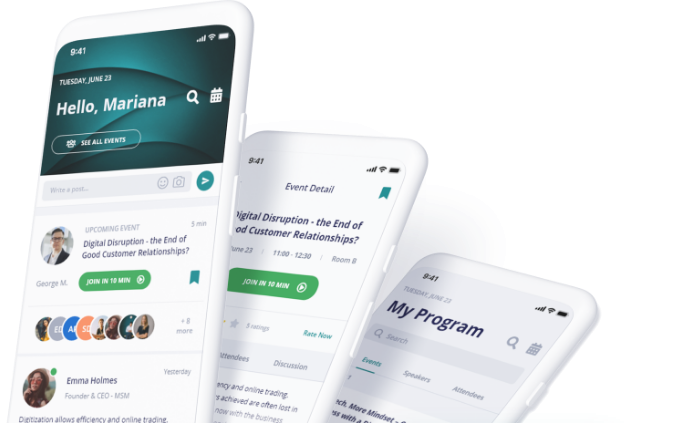
According to Social Tables, the implementation of event technology will increase attendance by 20% and planners’ productivity by 27%. Additionally, mobile event apps are reported as a positive contribution to event ROI, 78% of the time. These statistics highlight the importance of integrating event technology, in this case, event mobile apps into your event management strategies.
Also, being the event industry so saturated, understanding what ROI is and how to optimize it is critical for event organizers. But what is the event ROI, and what does it have to do with event technology and event apps? Let’s explore it together, in this article!
Understanding Event ROI
Before we understand what is the Event ROI as a “full concept” we need to keep in mind that it is not something “steady”-it can be a lot of things and often complex. But, the more complex the more accurate it will be and more powerful to understand how is your event driving revenue.
Event ROI is the term that tells us the net value that an organization will get from an event for the costs that will go into the production of that event.
This seems simple, right? But event ROI is much more than that!
The “value” is a broad concept here, since it could be the revenue generated from sold event tickets, sponsorships, and event metrics, among others, and the cost of an event can be seen not only as the value associated with the production costs but also the resources and time associated with it. Summing up, we can think of ROI as the assessment of both tangible and intangible benefits and costs of an event.
Mobile Apps for Events

A mobile app can be a great addition to your event since they offer a set of features designed to increase the attendee experience and ease event management. From personalized timetables and agendas, to real-time updates, and check-ins, these features will align with your event goals and maximize the Event ROI.
Event Mobile Apps Benefits
Let’s explore which benefits can a mobile app bring to your event!
- Access to information: Having a mobile app for your event can help attendees access important event information such as timetables, agenda, and event notifications-providing a dynamic experience and helping them plan efficiently.
- Personalization: Most Mobile Event Apps offer personalization features that will allow the attendees to curate their event agendas based on their interests. More than enhancing the attendee experience, these features will also increase engagement, which is a key factor in driving ROI.
- Analytics and Data-Driven Insights: Some Mobile Event Apps track attendee behavior, session participation, engagement levels, and interactions with sponsors, in real-time. This can help us demonstrate clear ROI to stakeholders, for example.
How they can increase ROI
We’ve seen some benefits of using a mobile event app but how can they help improving your event’s ROI?
For the Event Planners
- Cost Efficiency: The bigger the event, the bigger the costs associated with printouts, for example-if you have an event app, you can make this cost disappear-having all the info you need in the palm of your hand. Imagine that you have to change something in the event program, are you going to print everything again? With the mobile app, there’s no need for that!
- Security: Mobile Event Apps put data security and privacy in the first place, ensuring that all the attendee data is handled securely and in compliance will legal regulations, guaranteeing that all personal data is managed accordingly and protected. More than protecting your attendees, this will help you build trust in your events, a crucial factor for ROI.
- Staffing Efficiency: With the ability of these apps to do check-ins and automate administrative tasks that can now be completed by the event attendees, the need for event helpers is smaller, and that will result in fewer costs.
For the Attendees
- Easier than ever for attendees to plan: Planning for an event is easy with a mobile app. The attendees can navigate and see which content they are interested in, where and when the sessions start, and how to get there/in which links. With the app, we can ensure that the attendees won’t miss opportunities to network, visit sponsors’ booths, and access other resources. This will create an experience of excellence throughout the event.
- Boosting Attendance and Enhancing Experience: With the benefits that these apps offer like providing check-in, and real-time updates, among others, the attendees will become engaged and eager to participate in the events.
For the Sponsors
- More revenue for sponsors: Sponsors can see the event as a way to gain exposure to a specific target group and with the event app, the sponsors have a direct channel to reach that target, sometimes before and after the event too. Mobile Event Apps can enhance branding by offering banner ads and sponsored sessions, reinforcing the sponsor branding.
- Lead Generation: Some mobile event apps allow the sponsors to capture leads with badge scanning features or other in-app tools. This will help with lead generation, and ensure a more precise and useful data collection while making it easier for sponsors to track their ROI from the event.
- Communication in Real-Time: Sponsors can communicate with the event participants through app notifications and reminders, messaging, and other features. This will enhance the sponsor’s visibility and impact, contributing to a better ROI.
In Conclusion
Mobile Apps directed to events are here to stay and will keep reshaping the event sector! They are a powerful tool that can enhance the ROI of your events. From simplifying tasks for event planners, enhancing the event experiences for the attendees, and offering opportunities of value for sponsors, mobile event apps ensure that every stakeholder can gain maximum value from the event.
Having a mobile event app is less of a trend and more of a need for organizations that want to stay competitive and keep thriving in the event industry. So, whether you’re planning a small company gathering or a large conference, why not integrate a mobile app into your event strategy?




